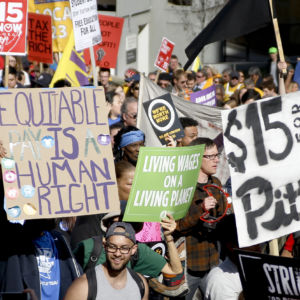The Fight for $15 movement was still able to celebrate stateside victories Friday despite the election earlier in the week going mostly to minimum wage critics.
Republicans secured the presidency and congressional control during the election Tuesday. Most of these candidates were skeptical of the benefits of raising the minimum wage because economics indicates such a price floor increases unemployment. Four states, however, voted on ballot measures Tuesday in support of increasing their local minimum wages.
“We’ve won raises for 22 million hard-working Americans, and transformed how we talk about work and wages in this country,” Fight for $15 stated on its website. “Together, we kickstarted this movement for good pay for hard work and it shows no sign of stopping. This week, we went to the ballot box and won higher wages.”
The successful ballot box measures occurred in Arizona, Colorado, Maine and Washington. Washington will increase their minimum wage to $13.50 while the other states are looking at going to $12 an hour by 2020. New York and California remain the only states to pass an increase as high as $15 an hour.
“Those states join the likes of New York and California, and cities across the country, that have backed this fight,” Fight for $15 also wrote. “Our work is far from over, but it’s obvious to everyone now that high wages are winnable everywhere. We won’t stop until we do.”
The Fight for $15 movement has been at the forefront of the minimum wage push since it started in 2012. The movement hadn’t officially backed a presidential candidate but its union backers did endorse Democratic nominee Hillary Clinton.
Clinton earlier in the campaign said the federal minimum wage shouldn’t exceed $12 an hour. The current federal minimum wage is $7.25 an hour. She did say she supported states that went higher than $12 and eventually came to support the $15 an hour mark. Republican presidential-elect Donald Trump remained opposed to the $15 minimum wage.
The Fight for $15 and other supporters of raising the minimum wage argue the policy is a great way to lift low-wage workers out of poverty. Critics warn it will actually hurt the poor by reducing employment opportunities. Employment Policies Institute Research Director Michael Saltsman noted unions were just able to outspend those groups against the policy.
“Our final read of the data was about $15 million total spent on minimum wage campaigns in those states, just by the proponents,” Saltsman told InsideSources. “Most of that money in those cases, or at least the majority, came from out of state.”
The potential problem with minimum wage increases is the cost that comes with it. Industries with low profit margins like restaurants or retailers might have to reduce the amount of workers they have or decrease their hours to overcome the added cost of labor.
“You have unions, that are essentially political organizations, that have a war chest of millions of dollars that they can throw at a policy issue like this,” Saltsman said. “And then you have local small businesses on the other side that do not have that kind of money.”
Economists have been fairly split on the minimum wage but generally agree, at least some job loss is a risk. The National Bureau of Economic Research and The Heritage Foundation found the risk is especially bad for young and low-skilled workers. The University of California, Berkeley found any losses would be marginal.

